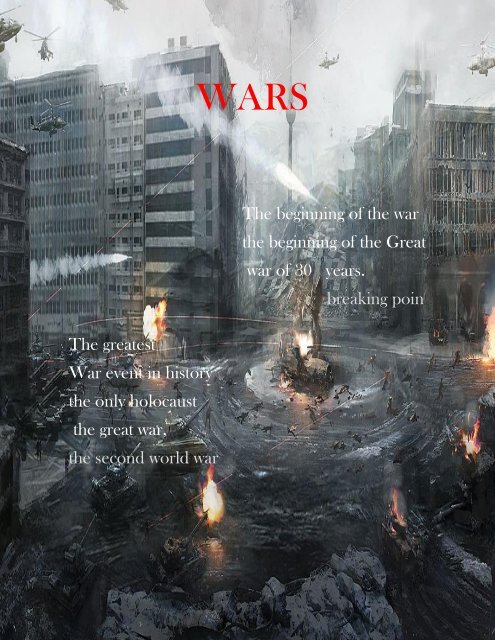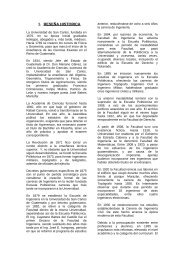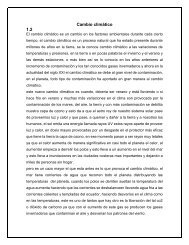WARS.
You also want an ePaper? Increase the reach of your titles
YUMPU automatically turns print PDFs into web optimized ePapers that Google loves.
<strong>WARS</strong><br />
The beginning of the war<br />
the beginning of the Great<br />
war of 30 years.<br />
breaking poin<br />
The greatest<br />
War event in history<br />
the only holocaust<br />
the great war,<br />
the second world war
American civil war<br />
After several years of the war of independence<br />
the United States was comvirtio in a very stable<br />
nation the bad thing was in that the recidentes<br />
of the south began to a slave trade never seen<br />
and to the north it does not like that in a few<br />
words it is a war To the base of the racism
Abraham Lincoln<br />
lost a senatorial race<br />
in which he<br />
demanded a stop in<br />
the expansion of the<br />
slavery, but in 1860<br />
he and Douglas<br />
returned to face:<br />
this time like the<br />
presidential<br />
candidates<br />
Republican and<br />
Democrat. By then<br />
the tension between<br />
North and South<br />
was extreme. In<br />
1859, John Brown, a<br />
supporter of<br />
abolitionism, had<br />
attempted to<br />
initiate a slave<br />
rebellion in Virginia<br />
by attacking an army<br />
munitions depot.<br />
Brown was quickly<br />
captured, tried and<br />
sentenced to hang.<br />
After his execution<br />
many inhabitants of<br />
the North acclaimed<br />
.<br />
him like martyr.<br />
However, the<br />
whites of the South<br />
were convinced that<br />
the North was<br />
unwilling to<br />
maintain state<br />
liberties within the<br />
confederation of<br />
states that then<br />
constituted the<br />
United States of<br />
Americamany<br />
inhabitants of the<br />
North acclaimed him<br />
like martyr. However,<br />
the whites of the South<br />
were convinced that<br />
the North was unwilling<br />
to maintain state<br />
liberties within the<br />
confederation of states<br />
that then constituted<br />
the United States of<br />
America
Douglas urged Southern Democrats to remain in<br />
the Union, but these in turn named their own<br />
presidential candidate (John C. Breckinridge) and<br />
threatened to split up if the Republicans were<br />
victorious; There was also another Southern<br />
candidate who opposed Lincoln, John C. Bell.<br />
Most in the southern and border states voted<br />
against Lincoln, but the North supported him and<br />
won the election. In March 1861, when Lincoln<br />
took office, South Carolina, Mississippi, Florida,<br />
Alabama, Georgia, Louisiana, and Texas were<br />
constituted in the Confederate States of America<br />
with Jefferson Davis as president, proclaiming his<br />
secession from the Union, act Which Lincoln<br />
declared illegal in his inaugural address. The first<br />
act of war was the confederate assault on the<br />
Fort Sumter garrison on April 12, 1861. Army<br />
repression of Fort Sumter caused the<br />
Confederate states to join Virginia, Arkansas,<br />
Tennessee, and North Carolina. Thus began the<br />
civil war between the Confederate States of the
South and the States of the North, which would<br />
end the victory of the latter in 1865
The great war the beginning<br />
of the greatest massacre in<br />
human history the first world<br />
war was the base to give<br />
place to its predecessor the<br />
second world war all begins<br />
in a prenazista germany and<br />
a france in the sights of the<br />
german storyteller sometimes<br />
Smaller things unleash<br />
great disasters.<br />
A war developed mainly in<br />
Europe, which began on<br />
28 July 1914 and ended on<br />
11 November 1918, when
Germany accepted the<br />
terms of the armistice.<br />
After six months of<br />
negotiations at the<br />
Paris Peace Conference,<br />
on June 28, 1919 allied<br />
countries signed the<br />
Treaty of Versailles with<br />
Germany, and others over<br />
the next year with each of<br />
the defeated powers. More<br />
than nine million combatants<br />
and seven million civilians<br />
were killed, an extraordinarily<br />
high figure given the technological<br />
and industrial sophistication of
the belligerents. It is considered<br />
the fifth deadliest conflict in<br />
the history of mankind.c Such<br />
was the convulsion that<br />
provoked the war, which<br />
paved the way for great<br />
political changes, including<br />
numerous revolutions with<br />
a character never before<br />
seen in several of the<br />
nations involved
Second World War<br />
The largest begins in a Poland, Hungary,<br />
colossus of strong Nazi Czechoslovakia<br />
genocides Germany and among others<br />
World War II wanting to the best Nazi ally<br />
as already govern its first was The italy of<br />
mentioned objective was Mussolini and<br />
above all followed by Japanese<br />
ingloran an embarrassment for Germany<br />
while on the other side of the Pacific a united<br />
states colossus and on the other side the red<br />
bear USSR or Soviet Russia the only one<br />
that could and could for the great Nazi power<br />
but this alone Is the beginning of one of the<br />
greatest historical facts of human history
War war never changes<br />
The war causes of the outbreak of World<br />
War II are, in the West, the invasion of<br />
Poland by the German troops and, in the<br />
East, the Japanese invasion of China, the<br />
British, Dutch colonies and later the attack<br />
on Pearl Harbor.<br />
World War II erupted after these<br />
aggressive actions received a declaration<br />
of war, armed resistance or both, by the<br />
aggressed countries and those with whom<br />
they had treaties. At first, the Allied<br />
countries were formed only by Poland, the<br />
United Kingdom and France, while Axis<br />
forces were made up only of Germany and<br />
Italy in an alliance called the Steel Pact.<br />
THE TREATY OF VERSAILLES,<br />
ESTABLISHED THE COMPENSATION<br />
THAT GERMANY HAD TO PAY TO THE<br />
VICTORS OF THE FIRST WORLD WAR.<br />
THE UNITED KINGDOM OBTAINED<br />
MOST OF THE GERMAN COLONIES IN<br />
AFRICA AND OCEANIA (ALTHOUGH<br />
SOME WENT TO JAPAN AND<br />
AUSTRALIA). FRANCE, ON WHOSE<br />
SOIL MOST OF THE COMBATS OF THE<br />
WESTERN FRONT WERE FOUGHT,<br />
RECEIVED AS PAYMENT A GREAT<br />
ECONOMIC INDEMNITY AND THE<br />
RECOVERY OF ALSACE AND<br />
LORRAINE, WHICH HAD BEEN<br />
ANNEXED TO GERMANY BY OTTO<br />
VON BISMARCK AFTER THE FRANCO-<br />
PRUSSIAN WAR IN 1870
IN THE RED ARMY IT<br />
TKES MORE COURAGE<br />
TO ADVANCE TO<br />
RETREAT
January 1945-April<br />
1945 With the Balkans<br />
and most of Hungary<br />
cleared of German troops<br />
in late December 1944,<br />
the Soviets began a<br />
massive redeployment of<br />
their forces to Poland for<br />
their impending winter<br />
offensive. Soviet<br />
preparations were still<br />
underway, when<br />
Churchill asked Stalin to<br />
launch his offensive as<br />
soon as possible to<br />
relieve German pressure<br />
in the West. Stalin<br />
agreed and the offensive<br />
was arranged for January<br />
12, 1945. Könov's armies<br />
attacked the Germans in<br />
southern Poland and<br />
expanded from their<br />
bridgehead on the Vistula<br />
near Sandomierz. On 14<br />
January, Rokossovsky's<br />
armies attacked from the<br />
Narew River north of<br />
Warsaw. The Zhukov<br />
armies, located in the<br />
center, attacked from<br />
their.<br />
Hitler believed that the<br />
main objective for the<br />
impending Soviet<br />
offensive would be in the<br />
south near Prague, not<br />
Berlin, and had sent the<br />
last German reserves to<br />
defend in that sector. The<br />
main objective of the Red<br />
Army was actually Berlin<br />
and by April 16 was ready<br />
to begin its final assault on<br />
to begin its final assault on<br />
Berlin. Zhukov's forces<br />
struck the center and<br />
crossed the river Oder but<br />
were detained because of<br />
desperate German<br />
resistance in the Seelow<br />
Heights. After three days of<br />
very hard fighting and<br />
33,000 dead Soviet soldiers,<br />
31 the last defenses of<br />
Berlin were penetrated.<br />
Konon crossed the Oder<br />
River from the south and<br />
found that he could attack<br />
Berlin but Stalin ordered him<br />
to guard the flanks of<br />
Zhukov's forces and not<br />
attack Berlin.<br />
Rokossovskiy's forces<br />
crossed the Oder from the<br />
north and linked with Field<br />
Marshal Bernard<br />
Montgomery's forces in<br />
northern Germany while<br />
Zhukov's and Konon's<br />
forces captured Berlin<br />
By 24 April, Soviet army<br />
groups had surrounded the<br />
9th German Army and part<br />
of the 4th Panzer Army.<br />
These were the main forces<br />
that supposedly had to<br />
defend Berlin, but Hitler had<br />
given orders to these forces<br />
that they stood where they<br />
were and that they did not<br />
back down. So the main<br />
German forces that<br />
supposedly had to defend<br />
Berlin, were trapped to the<br />
southeast of the city. Berlin<br />
was more or less surrounded<br />
at this time, and as a final<br />
resistance effort, Hitler called<br />
on civilians, including<br />
teenagers and elders, to fight<br />
in the Volkssturm militia<br />
against the Red Army<br />
Which was approaching.<br />
These marginal forces<br />
were augmented by the<br />
battered German<br />
remains that had fought<br />
against the Soviets in the<br />
Seelow Heights. Hitler<br />
ordered the fenced 9th<br />
Army to break the siege<br />
and link with General<br />
Walther Wenck's 12th<br />
Army and free Berlin. An<br />
impossible task, the<br />
surviving units of the 9th<br />
Army were led into the<br />
woods surrounding<br />
Berlin, near the village of<br />
Halbe, where they were<br />
involved in a particularly<br />
hard struggle, trying to<br />
break the Soviet lines<br />
and reach the 12th Army<br />
. A minority managed to<br />
join the 12th Army
So the bastard is dead<br />
What bad luck that we<br />
do not catch him alive<br />
Peace and Justice<br />
are two sides of the<br />
same coin<br />
The War ends in Europe<br />
Roosevelt, Churchill, and<br />
Stalin reached agreements<br />
for postwar Europe at the<br />
Yalta Conference in<br />
February 1945. Their<br />
meeting reached many<br />
important resolutions, such<br />
as the formation of the<br />
United Nations, democratic<br />
elections in Poland, the<br />
borders of Poland Moved<br />
westward at the expense of<br />
Germany, Soviet nationals<br />
would be repatriated, and it<br />
was agreed that the Soviet<br />
Union would attack Japan<br />
within three months of<br />
Germany's surrender<br />
The Allies resumed their advance into<br />
Germany in late January. The final obstacle<br />
for the Allies was the Rhine River, which was<br />
crossed at the end of March 1945, aided by<br />
the fortuitous capture of the Ludendorff<br />
Bridge at Remagen. Once the Allies had<br />
crossed the Rhine, the British fanned northeast<br />
towards Hamburg, crossing the Elbe<br />
River and moving towards Denmark and the<br />
Baltic Sea<br />
[Citar su fuente aquí.]
LITTLE BOY<br />
FAT MAN<br />
On August 6, 1945, a B-29 Superfortress, the Enola Gay, launched an<br />
atomic bomb nicknamed Little Boy over Hiroshima, destroying the city.<br />
On August 9, a B-29 named Bockscar launched the second atomic<br />
bomb, nicknamed Fat Man, on the port city of Nagasaki.<br />
Japanese Foreign Minister Mamoru Shigemitsu signs the Japan<br />
Surrender Act aboard the US battleship USS Missouri on September 2,<br />
1945.<br />
On 8 August, two days after the atomic bomb had been dropped on<br />
Hiroshima, the Soviet Union, having denounced its non-aggression<br />
pact with Japan in April, attacked the Japanese in Manchuria, fulfilling<br />
its promise made in Yalta to attack The Japanese three months after<br />
the end of the war in Europe. The attack was made by three Soviet<br />
army groups. In less than two weeks, the Japanese army in Manchuria,<br />
which consisted of about one million men, had been destroyed by the<br />
Soviets. The Red Army moved to North Korea on August 18. Korea<br />
was then divided on the 38th parallel in the Soviet and American<br />
zones.<br />
The US use of atomic weapons against Japan and the Soviet invasion<br />
of the Manchukuo caused Hirohito to hasten to overthrow the existing<br />
government and intervene to end the war. In his radio address to the<br />
nation, the Emperor did not mention the entry of the Soviet Union into<br />
the war, but in his "rewriting of the soldiers and sailors" of August 17,<br />
ordering the ceasefire and handing over the arms, accentuated the<br />
Relationship between the entry of the Soviets into the war and their<br />
decision to surrender, omitting any mention of the atomic bombs.the<br />
Japanese surrendered on August 14, 1945, or Victory Day on Japan,<br />
signing the Japanese Instrument of Surrender on September 2.<br />
Japanese troops in China formally surrendered on September 9, 1945.





